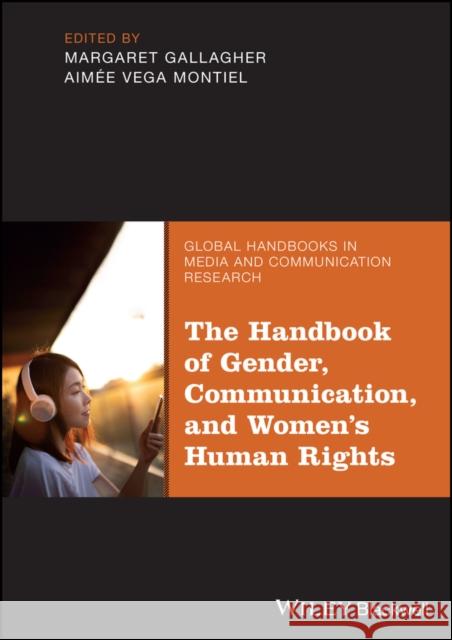The Handbook of Gender, Communication, and Human Rights » książka



The Handbook of Gender, Communication, and Human Rights
ISBN-13: 9781119800682 / Twarda / 2023 / 448 str.
1. Introduction: Gender, communication and women's human rights Margaret Gallagher and Aimée Vega Montiel Part 1. Governance and policy 2. Gender dimensions of communication governance: Perspectives, principles and practices Claudia Padovani 3. Communicating gender in global development Karin Gwinn Wilkins 4. Gendered disinformation and platform accountability Margaret Gallagher 5. From media reform to data justice: Situating women's rights as human rights Leslie Regan Shade Part 2. Systems and institutions 6. Gender, race and locality: Intersectionality in media and communication Laura Guimarães Corrêa 7. Gender dimensions of communication industries: A political economy analysis Carolyn Byerly 8. Power in AI: Inequality within and without the algorithm Kate Devlin 9. Challenges for women journalists in the age of Covid, and union and media repression: one trade unionist's perspective Mindy Ran 10. Women and the news: Reimagining journalism Maria João Silveirinha 11. Revisiting and unpacking the #MeToo moment Ammu Joseph Part 3. Content, rights and freedoms 12. Promoting gender equality in media content: A limitation or extension of freedom of expression? Maria Edström and Eva-Maria Svensson 13. Digital culture, online misogyny and gender-based violence Debbie Ging 14. Media do not represent me: Young women's social media lives Rosalind Gill and Whitney Francois-Cull 15. Gendering surveillance from a South Asian perspective Shmyla Khan 16. Pornography in feminist theory Rosa Cobo Bedía 17. Violence against women in and through the media and digital technologies Aimée Vega Montiel Part 4. Strategies, advocacy and activism 18. The Feminist Principles of the Internet: A framework for feminist organizing and research in the digital age Jan Moolman and Christy Alves Nascimento 19. Lessons learned from communication strategies created by indigenous women Karla Prudencio 20. Gender equality in and through the media in Southern Africa Tarisai Nyamweda 21. Digital media and feminist activism in Latin America: Cyberfeminism 3.0 Graciela Natansohn 22. A feminist critique of gender mainstreaming in journalism and communication education Yanet Martínez-Toledo, Lucía Gloria Vázquez Rodríguez and María Soledad Vargas 23. Building the evidence for feminist advocacy and awareness-raising: The Global Media Monitoring Project Sarah Macharia 24. Transnational feminist organising and advocacy for gender justice and women's rights Dinah Musindarwezo, Sanyu Awori and Felogene Anumo 1. Introduction: Gender, communication and women's human rights Margaret Gallagher and Aimée Vega Montiel Part 1. Governance and policy2. Gender dimensions of communication governance: Perspectives, principles and practices Claudia Padovani 3. Communicating gender in global development Karin Gwinn Wilkins 4. Gendered disinformation and platform accountability Margaret Gallagher 5. From media reform to data justice: Situating women's rights as human rights Leslie Regan Shade Part 2. Systems and institutions6. Gender, race and locality: Intersectionality in media and communication Laura Guimarães Corrêa 7. Gender dimensions of communication industries: A political economy analysis Carolyn Byerly 8. Power in AI: Inequality within and without the algorithm Kate Devlin 9. Challenges for women journalists in the age of Covid, and union and media repression: one trade unionist's perspective Mindy Ran 10. Women and the news: Reimagining journalism Maria João Silveirinha 11. Revisiting and unpacking the #MeToo moment Ammu Joseph Part 3. Content, rights and freedoms12. Promoting gender equality in media content: A limitation or extension of freedom of expression? Maria Edström and Eva-Maria Svensson 13. Digital culture, online misogyny and gender-based violence Debbie Ging 14. Media do not represent me: Young women's social media lives Rosalind Gill and Whitney Francois-Cull 15. Gendering surveillance from a South Asian perspective Shmyla Khan 16. Pornography in feminist theory Rosa Cobo Bedía 17. Violence against women in and through the media and digital technologies Aimée Vega Montiel Part 4. Strategies, advocacy and activism 18. The Feminist Principles of the Internet: A framework for feminist organizing and research in the digital age Jan Moolman and Christy Alves Nascimento 19. Lessons learned from communication strategies created by indigenous women Karla Prudencio 20. Gender equality in and through the media in Southern Africa Tarisai Nyamweda 21. Digital media and feminist activism in Latin America: Cyberfeminism 3.0 Graciela Natansohn 22. A feminist critique of gender mainstreaming in journalism and communication education Yanet Martínez-Toledo, Lucía Gloria Vázquez Rodríguez and María Soledad Vargas 23. Building the evidence for feminist advocacy and awareness-raising: The Global Media Monitoring Project Sarah Macharia 24. Transnational feminist organising and advocacy for gender justice and women's rights Dinah Musindarwezo, Sanyu Awori and Felogene Anumo
MARGARET GALLAGHER is an independent researcher who has published widely on gender, media, and communication rights. She started her career at the British Broadcasting Corporation (BBC) before moving to the Open University, where she was Deputy Head of the Audio-Visual Media Research Group. She has consulted for the United Nations, the European Commission, the Council of Europe, as well as international development agencies and broadcasting organizations. She serves on the editorial boards of International Communication Gazette, Feminist Media Studies, and Media Development.AIMÉE VEGA MONTIEL is a researcher at the Center for Interdisciplinary Research in Sciences and Humanities at the National Autonomous University of Mexico (UNAM). She is Co-Chair of the UNESCO UNITWIN on Gender, Media, and ICTs, and Chair of the Global Alliance on Media and Gender (GAMAG). She is a past Vice-President of the International Association for Media and Communication Research (IAMCR) and has served as an expert for the Council of Europe Recommendation of Gender Equality in the Audiovisual Sector.
1997-2026 DolnySlask.com Agencja Internetowa
KrainaKsiazek.PL - Księgarnia Internetowa









